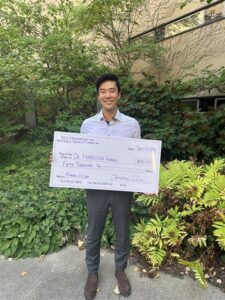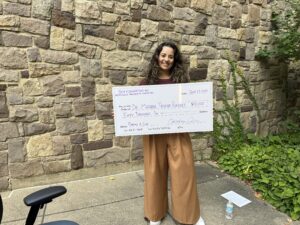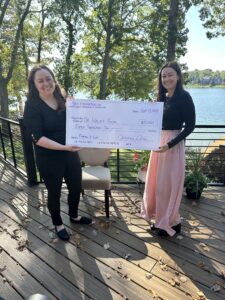Dr. Harrison L. Hiraki
Harrison L. Hiraki, PhD — Rogel and Blondy Cancer Center (University of Michigan)
Dr. Hiraki is advancing our understanding of how the pancreatic-cancer microenvironment influences disease progression and therapy response. One of his recent discoveries revealed how sulfide oxidation promotes hypoxic angiogenesis and neovascularization — a key insight into how tumors grow and spread under low-oxygen conditions.
His engineering and biomedical background equips him to build cutting-edge models of tumor behavior, with the goal of translating lab findings into therapies. Thanks to your support, Dr. Hiraki is able to push forward with bold experiments that may one day lead to more effective treatment strategies for pancreatic cancer.
Dr. Mariana Tannus Ruckert
Mariana Tannus Ruckert, PhD — Rogel and Blondy Cancer Center / University of Michigan
Dr. Ruckert focuses on mitochondrial dynamics and the interface between mitochondria and the endoplasmic reticulum (ER) in the earliest stages of pancreatic tumorigenesis. In other words: she’s exploring how the powerhouses of the cell (mitochondria) and their connections to the ER influence the very first steps of pancreatic cancer formation.
By uncovering how cellular metabolism and organelle-contacts drive malignancy, her work opens doors to entirely new ways of detecting and interrupting pancreatic cancer before it becomes advanced. Your contribution is helping fuel this promising line of research — a potential game-changer for early detection and prevention.
Dr. Adrianne Wallace-Povirk
Adrianne Wallace‑Povirk, PhD — Henry Ford Health (and earlier affiliations)
Dr. Wallace-Povirk is a dedicated cancer biologist committed to collaborative, hypothesis-driven work. Her research has spanned one-carbon metabolism and folate receptor–targeted therapies, and she brings that metabolic insight to the broader context of cancer biology.
While her publicly documented work has more strongly associated with ovarian cancer, her skills and mindset offer tremendous promise when applied to pancreatic cancer research as well — especially in terms of targeting metabolic vulnerabilities in tumors. With support from your generosity, she is now contributing to a team poised to deliver new therapeutic strategies and bring hope to patients with pancreatic cancer.
Why This Matters
Each of these researchers is taking a different but complementary approach to tackling pancreatic cancer:
- Dr. Hiraki focuses on the tumor environment and how it supports growth and spread.
- Dr. Ruckert is probing the metabolic and organelle-level mechanics of tumor initiation.
- Dr. Wallace-Povirk brings a hunger for translational metabolic-therapy research capable of moving from bench to bedside.
Because you invested in them by supporting our mission, all three are able to push boundaries, explore bold ideas, and aim for breakthroughs that would have been impossible without donor-backed funding.
Thank you: your investment in research IS where the dollars go — powering real science, real hope, and real progress.



